Në metropolin e Çikagos, Komuniteti Shqiptar në Illinois – Albanian Community of Illinois me president të riun nga Presheva, Edon Shaqiri organizuan me shqiptarët Festën e Flamurit.
Në mesditën e 28 Nëntorit në DownTown, ndanë Rrugës Washington, u ngrit lart mes brohërimave Flamuri Shqiptar, aty mes rrokaqiejve, edhe mbi veprën monumentale dhe të njohur të Picasso-s, – shkruante shkrimtari Visar Zhiti. Në ceremoni ishin dhe kongresmeni Joe DioGurdi me bashkëshorten, po edhe Kosulli i Republikës së Kosovës, Drilon Zogaj .
Po kështu dhe në mbrëmjen festive në Niles. Salla e madhe ishte plot, e zbukuronin të rinjë dhe flamujt kudo, këngët dhe vallet.
Në fillim u kënduan dy Himnet Kombëtare, ai Shqiptar dhe ai Amerikan. Presidenti i Komunitetit, Edon Shaqiri, pasi do t’i uronte mirëseardhjen të githëve, do të fliste për rëndësinë e kësaj date dhe lavdinë e saj dhe do t’ia jepte fjalën “të Ftuarit të Nderit”, shkrimtarit Visar Zhiti.
Emocionuese do të ishin dhe kujtimet e çiftit Shirley dhe Joe Dio Guardi, puna e tyre e çmuar. Dhe do të shpërthente koncerti, këngët e njohura patriotike dhe valet gjithe larmi ngjyrash e flamuj. Një festë e madhe, e bukur, dinitoze dhe me estetik;e kombëtare. Njëri prej organizatorëve që shquhet, por për urtësinë, është trajneri nga Kërçova, Taip Bes Hiri, ideatori i takimit me kongresmenin, mik të hershëm që “nga lufta”. Gjithçka shkëlqen dhe ai rri në prapavijë, si të gjithë në festë…
Si një sintezë jo vetëm e asaj dite, por e ecurinë në shekuj të Flamurit Kombëtar po botojmë fjalën e shkrimtarit.
SHQIPONJË LIRI ME TË KUQEN DIELLORE…
Nga Visar Zhiti
Festën Kombëtare, më të madhen e shqiptarëve, atë të Flamurit, pra, të Pavarësisë, kur hidhen themelet e shtetit modern shqiptar, e festojmë me madhështi në Atdhe e në gjysmën tjetër të Atdheut, në Kosovë, kudo në Ballkan ku ka copëza Shqipërie e shqiptarë, përtej detit, në Itali me arbëreshët e këngës dhe të poezisë, në të gjithë Europën, edhe përkëtej oqeanit, në Amerikë, në mbarë botën dhe mbase më bukur në diasporë festohet në SHBA dhe po aq solelmnisht në Chicago.
Sot u ngrit Flamuri shqiptar në DownTawn, dhe u valëvit mes atij të SHBA dhe të Shtetit Illonois.
Kur u mblodhëm, pamë se ishim shqiptarë nga të gjitha trevat tona, vërtet Shqipëria natyrale, etnike, – vetëm në SHBA ndodh kjo, – dhe mes nesh erdhi me bashkëshorten e tij dhe kongresmeni i shquar, me origjinë arbëreshe, Joe DioGuardi, që i kushtoi jetën çështjes shqiptare, çlirimit të Kosovës.
Na bashkoi Flamuri ynë, më i bukuri në botë, besojmë ne.
Ky Flamur është ngritur hijerëndë në kështjella dhe pirgje dhe fusha beteje, ka mbulur heronjtë, por dhe nëpër dasma, vargani i krushqëve kishte kryeflamurtar, e mbajnë duart e fëmijëve, ky flamur ngrihet mbi institucionet shtetërore, presidencë, parlament, kryeministri, por dhe në ballkone pallatesh, ku banojmë, në tryeza pune e në zarfe me pullat postare, është në takime ndërkombëtare, ne ceremonira e në fusha sporti e festa e ngrihet lart bashkë me Himnin, ringrihet me çdo fitore e titull kampion, e gjejmë dhe në valixhe emigrantësh si amanet, në librat e shkollës dhe antologji poezish, në sheshe e në veprimtaritë kudo, në ambasada në të gjithë shtetet e në Organizatën e madhe të Kombeve të Bashkuara, aty me të gjithë flamujt e tjerë, i sigurtë, i barabartë.
SHEKUJT E FLAMURIT
Flamuri ynë ashtu si shqiponja e tij që shihej si një shpend hyjnor, vjen nga kohëra të lashta e mitologji, ka të bëjë me pellazgët, me të cilët janë të lidhur ilirët, siç besohet nga shumë shkencëtarë. Prandaj dhe na quajnë “Bij të Shqipes”!
Zjarr prometean Flamuri ynë, – kam thënë…
Shqiponja ishte emblemë dhe e Pirros së Epirit. Gjendet dhe te shteti i parë i Arbërit i viteve 1199-1216, që kulmoi me shtetin e Skënderbeut, ku Kastriotët e kishin dhe në stemën e tyre.
Gjergji ynë e ngriti mbi kalanë e Krujës, duke e çliruar nga pushtuesit otomanë në 28 Nëntor 1443, gati 6 shekuj më parë.
Me këtë Flamur Shqipëria u bë muri mbrojtës i Europës, i qyteterimit Perëndimor. Ai është Flamuri i “Atletit të Krishtit”, Skënderbeut, pa të cilin, – do të thoshte dhe në kongresin amerikan kongresmeni ynë, ndoshta dhe Amerika do të ishte ndryshe.
Dy kokat e shqiponjës janë Orienti dhe Oksidenti, duhet vëzhguar në dy kahet, bashkimi mban dhe universin. Kur u nda perandoria e Romës, gjysma që mbeti Bizant, e bëri symbol shqiponjën me dy krerë, e mbajtën ilirët, etj.
E kuqja e tij është kozmogoni, lidhet me dritën biblike, shpjegojnë studiuesit. Por do të simbolizonte dhe gjakun e derdhur për liri.
Donin ta copëtonin shpatat e perandorive dhe të ushtrive të huaja uzurpuese, gjylet e topave të tyre, donin ta grinin plumbat, ta zbehnin, ta përçudnonin duke i shtuar spatat liktoriane apo yllin e komunizmit, ai i sfidoi të gjitha dhe triumfoi.
Në shekujt e pushtimit Flamuri do të përndiqej, do ta mallkonin e do ta digjnin. Hiri i tij mbetej në kujtesën e Kombit.Dhe po harroj si ishte, ja ashtu si flakët…
Rilindasit rithirrën Skënderbeun. po Flamurin?
Që në vitin e parë të shekullit XX, një djalë 26 vjeçar, Faik Konica, në mërgim, në Bruksel, do të tregonte në gazetën “Albania”, që e themeloi vetë se “…flamuri ynë, i cili është një nga më të ndershmit dhe më të lavduarit të botës, është pa dyshim edhe një nga më të vjetrit”.
Me këtë Flamuar kishin shkuar dhe në Lidhjen e Dytë, atë të Prizrenit më 1887. Edhe arbëreshi Terenc Toçi e ngriti në Mirditë në vitin 1911.
Por një vit më vonë Plaku i bardhë, Ismail Qemali, pas 5 shekuj robërie, do ta ringrinte akoma më lart në Vlorë, po në 28 Nëntorin skënderbejan dhe shpalli pavarësinë e Shqipërisë dhe hodhi themelet e shtetit modern shqiptar. S’kishte institucione e as ngrehina për to, as hotele. Nëpër shtëpitë e vlonjatëve kishin bujtuar, ku kishte zjarr dhe zemër.Po rrinin bashkë përfaqësuesit e krahinave, ministrat që do të emëroheshin, asambleja, senati, luftëtarët, malsorët, qehallarë, rojet, etj, etj.
Ndërkaq nga Rumania erdhi Himni i Flamurit. U pëlqye dhe u këndua aq shumë sa nuk u zëvendësua dot me asgjë tjetër. Njëra nga strofat në kohën e komunizmit, jo vetëm që nuk këndohej, por do të hiqej dhe nga botimet:
Se Zoti vetë e tha me gojë
Se kombet shuhen përmbi dhé,
Por Shqipëria do të rrojë,
Për të, për të luftojmë ne.
Në 1913 Flamuri kombëtar është prapë në rrezik. Donin ta copëtonin Shqipërinë.At’ Gjergj Fishta ngre Flamurin mbi kambanoren e kishës së tij, si flatër engj;elli do ta quante dhe banderolat që nga aty do të lidheshin me minaret e xhamive.
MBËSHTEJA JETIKE E SHBA-së…
Roli i SHBA do të ishte vendimtar. Presidenti Wilson ndikoi shumë, I informuar dhe diaspora shqiptare, nga udhëheqësit e saj, Konica dhe Noli, kontakti me shqiptaro-amerikanët.Sot në Tiranë është një shesh që mban emrin e Presidentit shpëtimtar, Wilson, me shtatoren e tij në mes.
Lëvizje dhe rebelime dhe demonstra me Flamur bëheshin herë pas here dhe në Kosovën që vazhdonte të ishte e pushtuar deri vonë. Shpesh forcat policore gdhiheshin duke gjetur të ngritur qyteteve gjatë natës Flamurin shqiptar. Sikur mbinte vetvetiu.
Kur të burgosurit politikë u ngritën në Spaç në revoltën që tundi së brendshmi themelet e diktaturës, në 1973, ata ngritën në mes të kampit, brenda telave me gjëmba, Flamurin pa yllin komunist. Po ku e gjetën? Një këmishë të bardhë e ngjyen me gjakun e tyre dhe piktori i burgosur bëri shqiponjën. E ngritën lart duke kënduar himnin me lot në sy. Katër të burgosur i pushkatuan dhe ridënuan dhjetra të tjerë, por dhe vetë burgun.
Prapë në 28 Nëntor 1997 shpallet se është krijuar Ushtria Çirimtare e Kosovës.
Dhe po në 28 Nëntor në Kosovë kishte lindur legjenda Adem Jashari, në 1955 në Prekaz. Bënin dimra të acartë atëhere, por më keq se dimri ishte dhuna policore e regjimit serb ndaj shqiptarëve.
Në 28 Nëntor, ç’koinçidencë e bukur, që u tha dhe këtu, ka lindur dhe Presidenti Komunitetit Shqiptar në Illinois – Albanian Community of Illinois, Edon Shaqiri, familja e tij ikën nga Presheva nga shkaku I luftës n:e Shkup dhe prej andej në SHBA.
Dhe do të ndërhynin forcat e NATO-s dhe SHBA në këtë betejë, jo vetëm çlirimtare, por dhe morale, mbrohej një popull nga eksodi masiv si në Bibël. Pas bombardimeve të Beogradit, Kosova u shpall Republikë më vete. Shqipëria u fut në NATO dhe Flamuri i saj është bashkë me flamujt e forcave Perëndimore euroatlantike, me demokracitë më të përparuara.
Shqipëria dhe Kosova, dy shtete shqiptare të vegjël në Ballkan, por me histori të lashtë, kanë gjetur te Shtete Bashkuara të Amerikës së madhe aleatin jetik, mbrojtësin dhe mbështetësin.
Prandaj dhe sot Flamuri ynë si një vëllai vogël valëvitet pranë atij amerikan si një vëlla i madh, më i fuqishmi në botër dhe i drejtë.
Më bukur se gjithkund Flamuri ynë është në zemra, atje ku jemi bashkë, ja, si sonte…

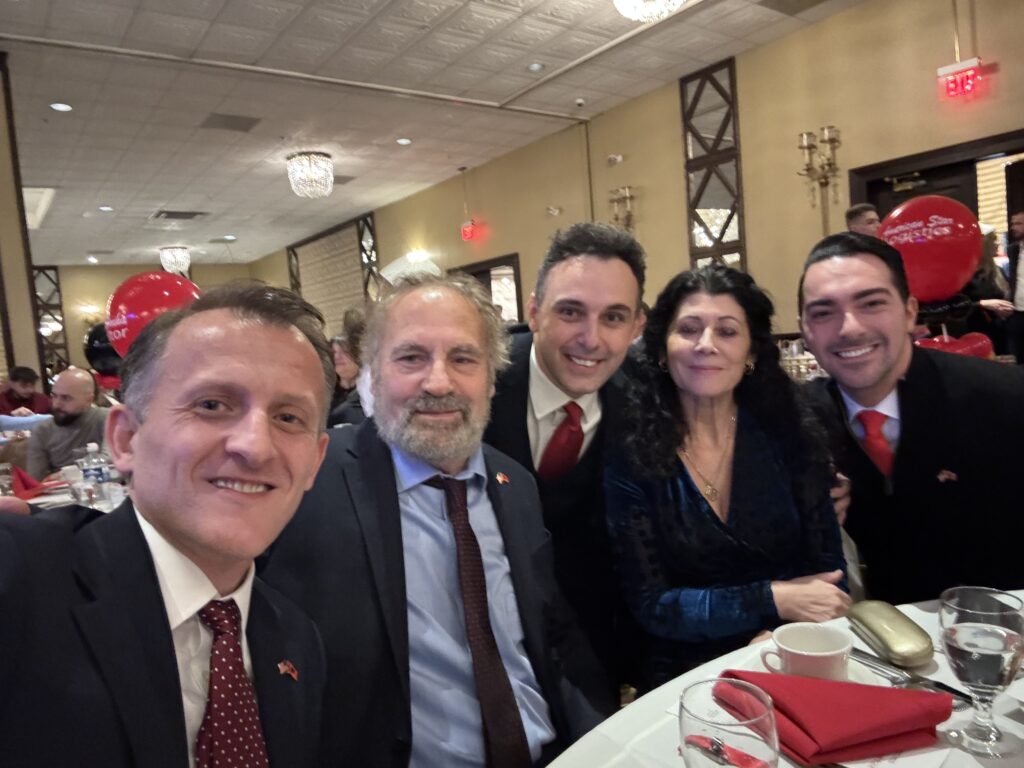
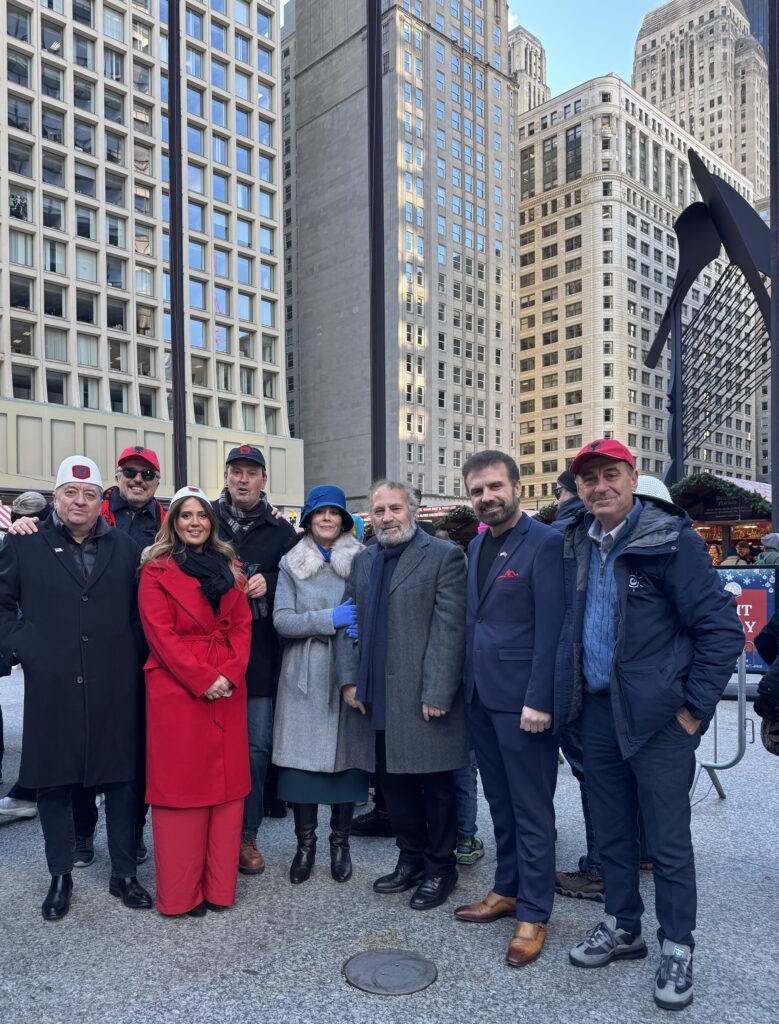
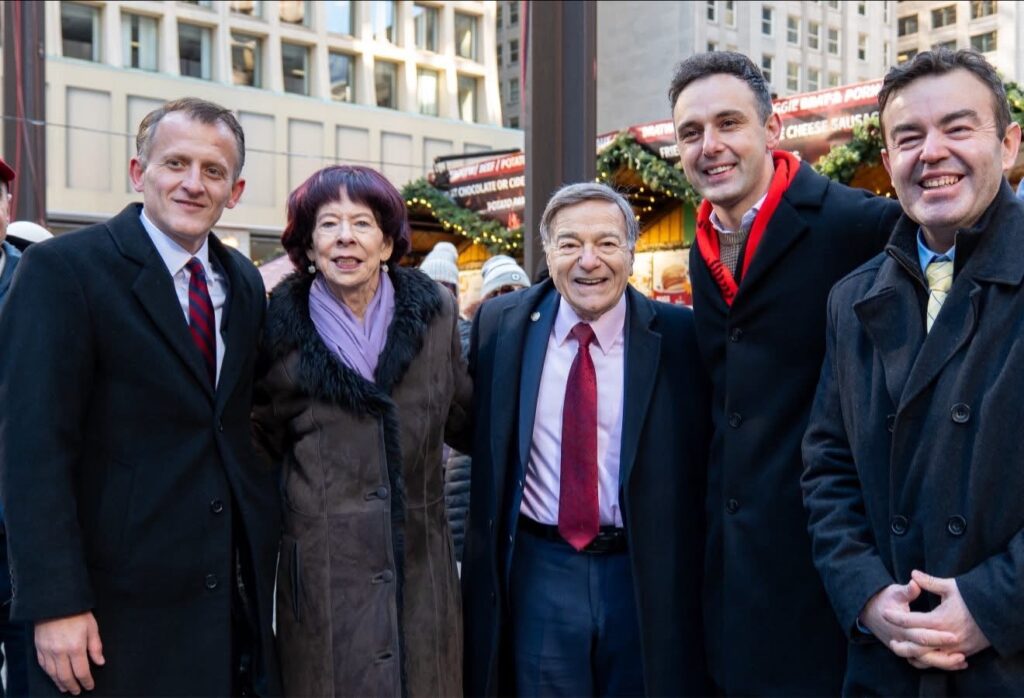

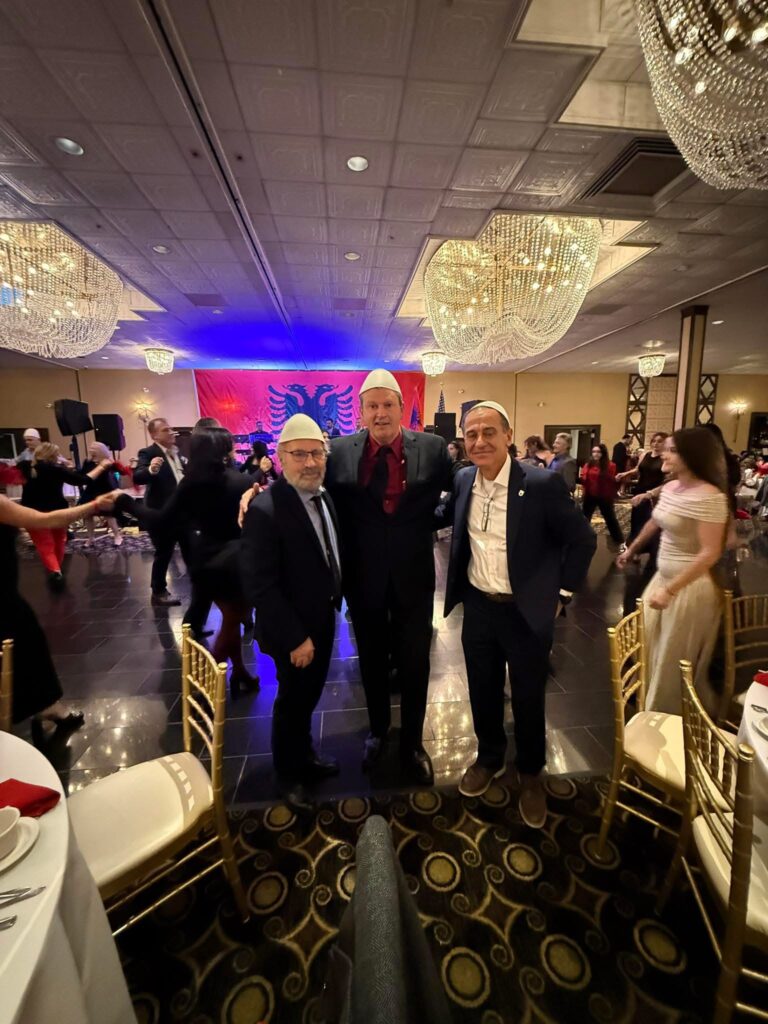
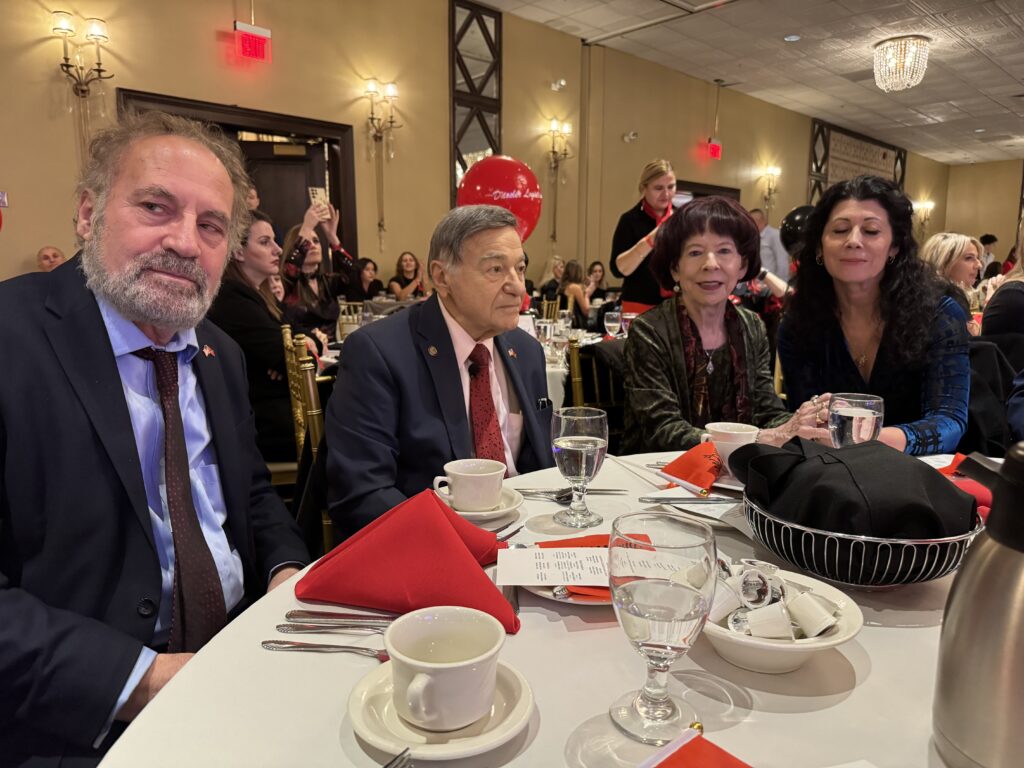
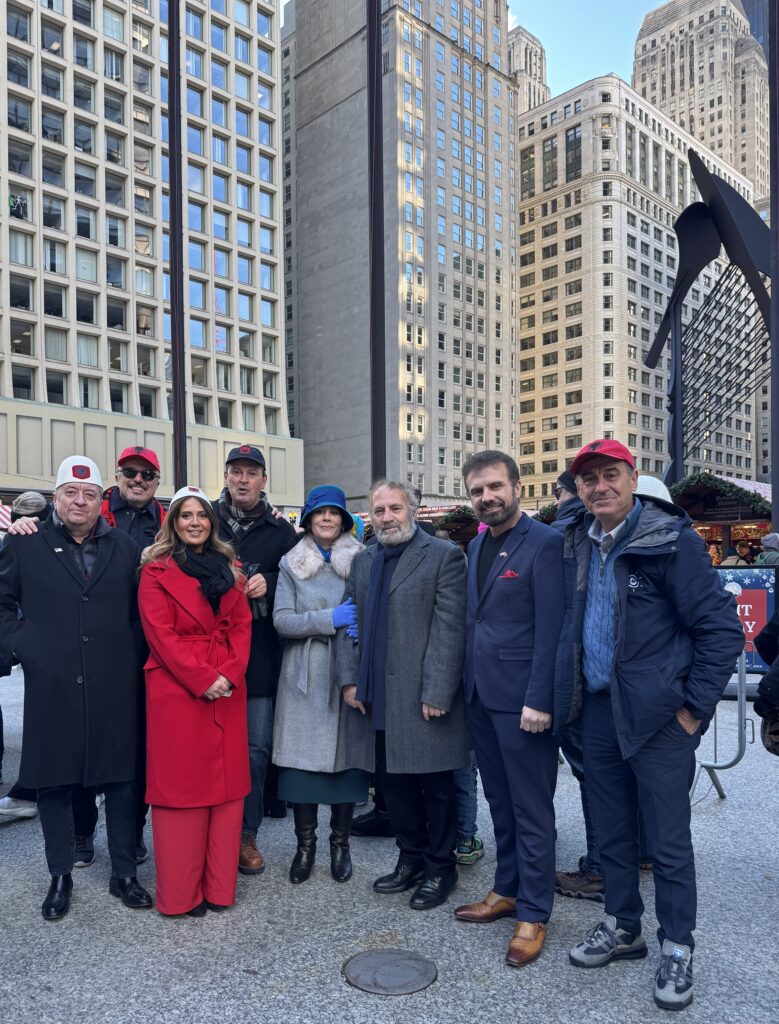
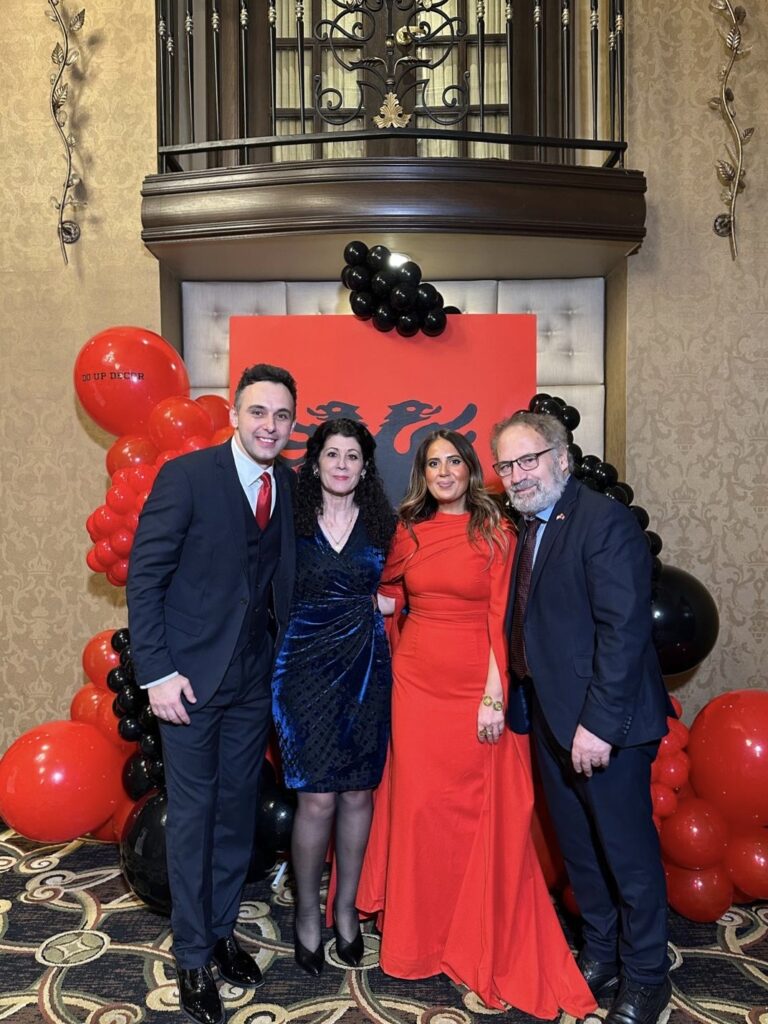

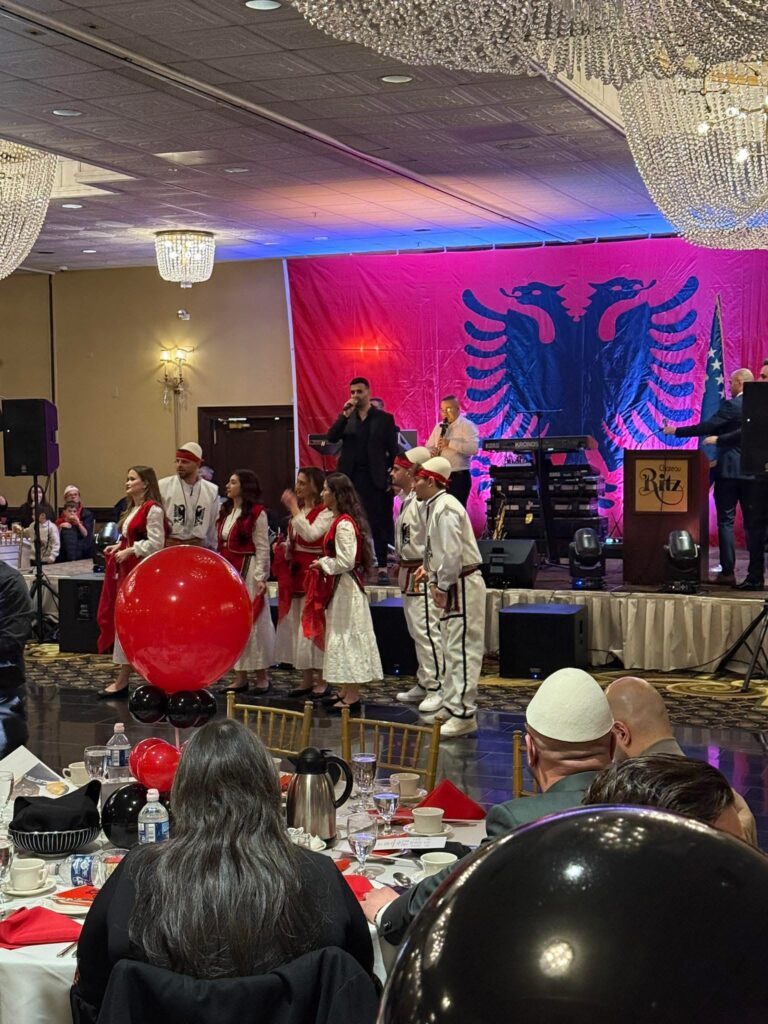

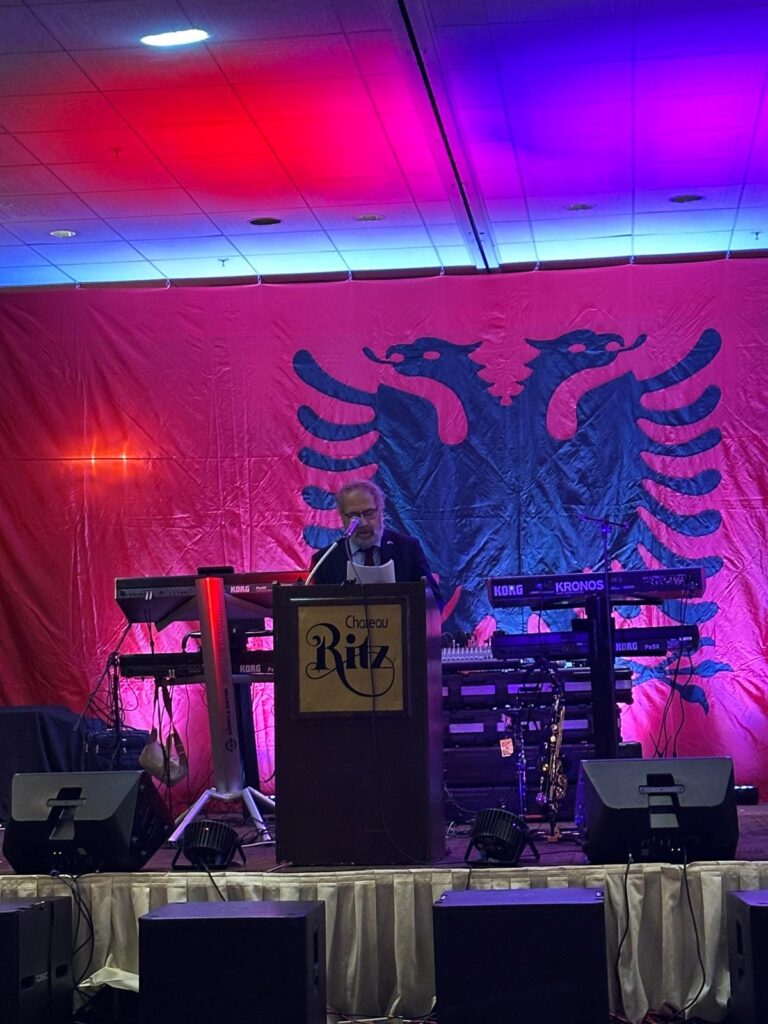
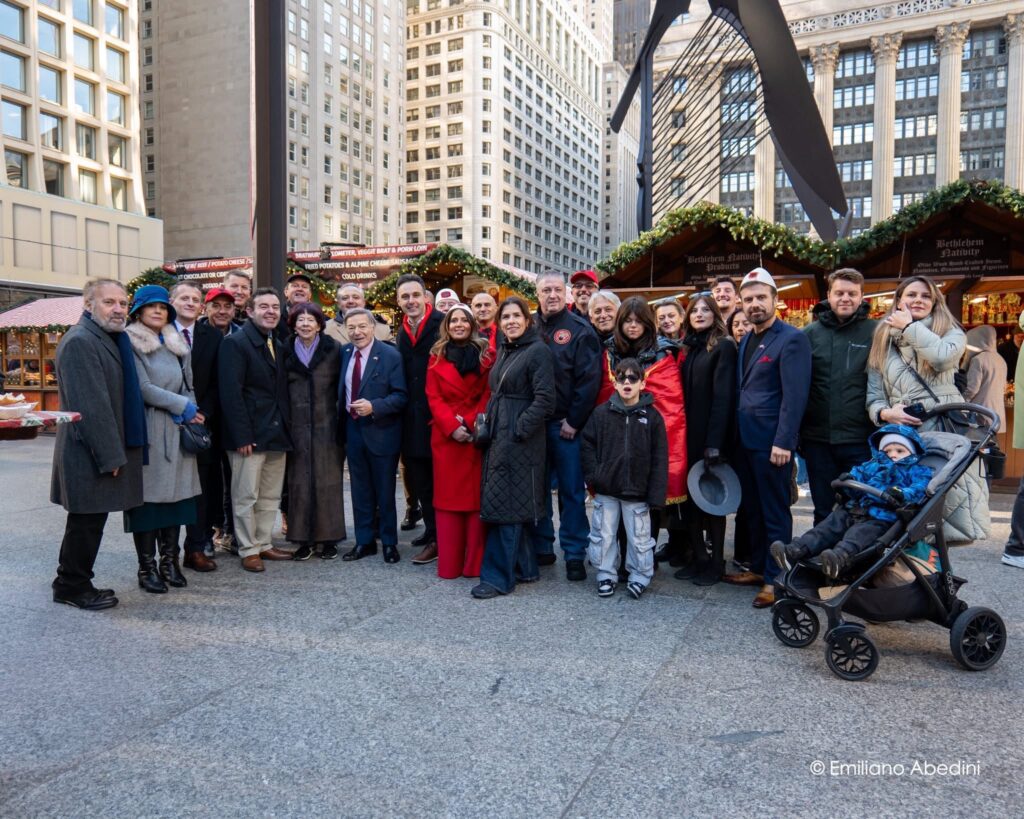
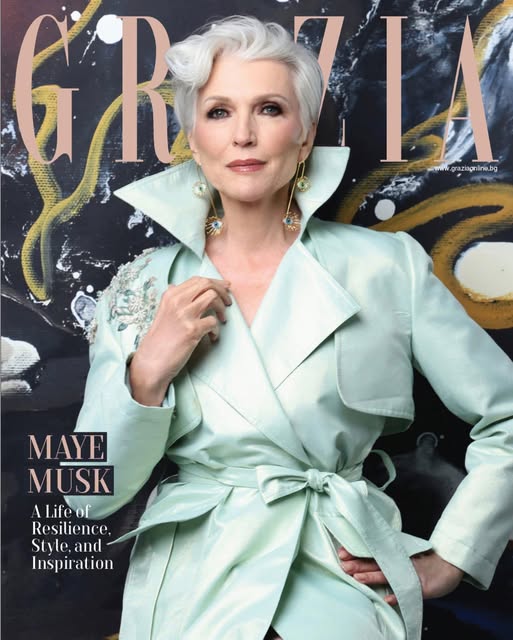
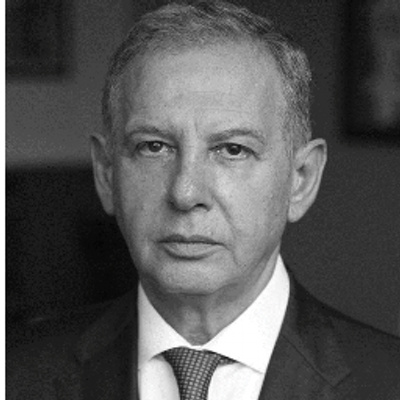
Interesting and insightful article. Thank you Rafaela Prifti for your recent years approach to interview on behalf of Vatra’s legacy solid expertise and collect an inter Albanian master file for the Balkans new international data on the Albanian cause.
Urime dhe suksese!
ND on behalf of Fan Noli Library, Boston
Interesting and insightful article. Thank you Rafaela Prifti for your recent years approach to interview on behalf of Vatra’s legacy solid expertise and collect an inter Albanian master file for the Balkans new international data on the Albanian cause.
Urime dhe suksese!
ND on behalf of Fan Noli Library, Boston
Interesting and insightful article. Thank you Rafaela Prifti for your recent years approach to interview on behalf of Vatra’s legacy solid expertise and collect an inter Albanian master file for the Balkans new international data on the Albanian cause.
Urime dhe suksese!
Boston
Interesting and insightful article. Thank you Rafaela Prifti for your recent years approach to interview on behalf of Vatra’s legacy solid expertise and collect an inter Albanian master file for the Balkans new international data on the Albanian cause.
Boston